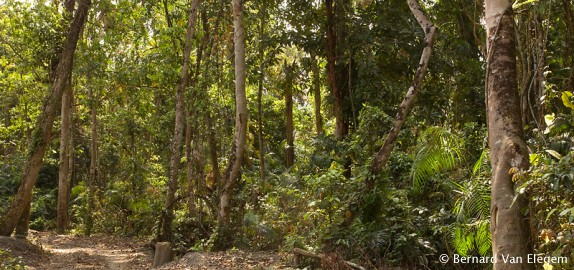Alluvial forest along the Brahmaputra river - Wetland met natuurlijke graslanden en meer
Kaziranga is one of the most important wetland areas in the floodplain of the Brahmaputra river. It consists of a natural mix of deciduous forests, grasslands, marshes, swamps, lakes and pools. The grasslands are held partially open by the huge amount of large grazers, such as several deer species, Indian rhino's, elephants and water buffalo's. The park is the stronghold for some of these threatened wetland species, such as the Water Buffalo, Swamp Deer and Indian Rhino, of which the world's largest populations are found within the park. Because of this, each year some of the elephant grass grasslands are burnt by the local park managers and rangers, to prevent them from a natural evolution to shrubbery and forest. With the local grazing pressure, helped by the burning of grasslands, the amount of vast open grasslands is kept more or less stable (which is 60 - 70 % of the park). Apart from the mentioned grazers the park is also a stronghold for plenty of other threatened wetland species, of which numerous bird species, such as the Greater and Lesser Adjudant, Spot-billed Pelican, Pallas' Fish Eagle, Slender-billed Vulture, Jerdon's Babbler, Black-breasted Parrotbill and many mammal species, such as Sloth Bear, Tiger, Leopard and Fishing cat.
The grassland hold tall elephant-grass and many other species, amongst which are Erianthus ravannae, Phragmites karka, Arundo donax, Saccharum elephantinus, Saccharum arundinaceum, Imperata cylindrica and Poinia ciliata. The forested parts consist of species such as Bombax ceiba, Albizzia odorotissima, Carreya arborea, Lagerstromia parviflora, Dillenia pentagyna and Zizyphus jujuba.
Along the lake and swamps Kaziranga also holds gallery forest and alluvial forest, which is a mixture of deciduous forest and monsoon forest. Along the Brahmaputra thick and more dense evergreen forest is found, as well as in the surrounding hills (Panbari Forest). This picture was made in the Eastern Range of the Park, which holds bigger forested areas.

